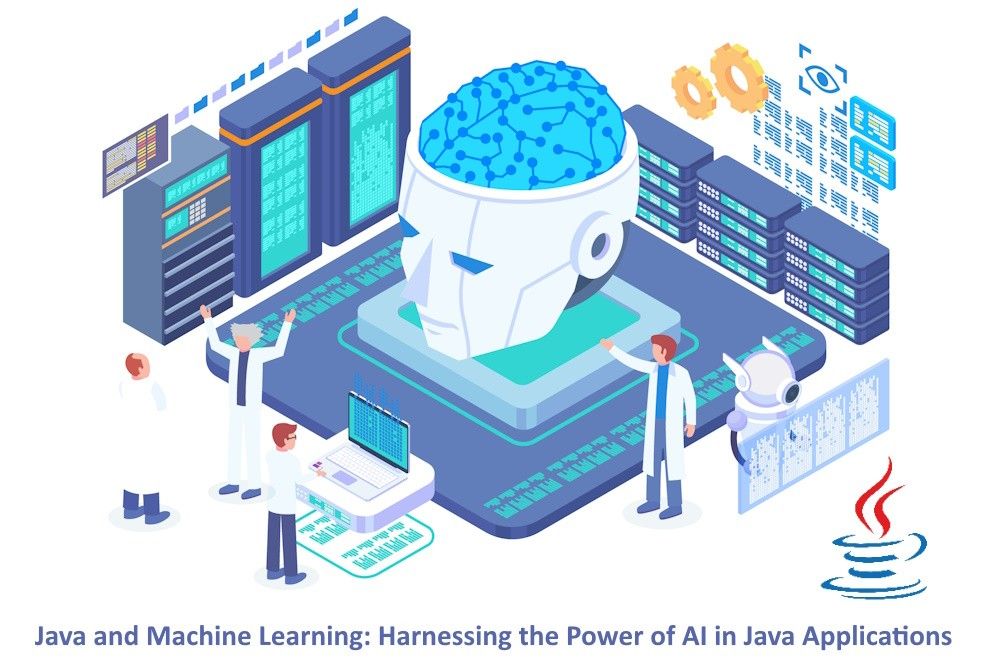
With the surge of Artificial Intelligence (AI) and Machine Learning (ML) in today’s digital landscape, the versatility of Java has proven to be instrumental in developing robust and efficient ML models. In the following sections, we delve into the intersection of Java and Machine Learning, exploring how Java is harnessed for AI and ML applications.
The Landscape of Java and Machine Learning
Java, a statically typed, class-based, object-oriented programming language, is known for its simplicity, security, and scalability. Its strong memory management, high performance, and platform-independent characteristics make it an ideal language for developing a wide variety of applications, including those that employ AI and ML.
- Interoperability with big data technologies: Java’s compatibility with Hadoop and other big data technologies makes it a favorable language for machine learning where handling large datasets is essential.
- Libraries and tools: Java offers a variety of libraries and tools such as Weka, DL4J, and MOA that are specifically designed for machine learning and data mining. These libraries simplify the process of creating and tuning machine learning models.
- Versatility: The object-oriented nature of Java allows for easy modularization of machine learning algorithms. This modularization enhances code maintainability and testability, making it easier for developers to build, test, and debug ML models.
- Scalability: Due to Java’s robustness and scalability, it can handle complex computations required by machine learning algorithms efficiently. This makes Java particularly useful for training large and complex machine learning models.
- Platform independence: Java’s platform independent nature allows machine learning models developed in Java to be deployed across various operating systems without the need for recompilation. This cross-platform compatibility is especially beneficial in machine learning as models can be trained on one platform and deployed on another.
Case Studies: Real-world Applications of Java in Machine Learning
Numerous real-world applications demonstrate the potency of Java in the realm of machine learning. For instance, in the healthcare sector, machine learning models built in Java are used for predicting disease outbreaks and analyzing patient data for personalized care. In the finance industry, Java-based ML models are employed for risk assessment, fraud detection, and investment predictions.
- Platform independence: Java’s platform-independent nature allows machine learning models developed in Java to be deployed across various operating systems without the need for recompilation. This cross-platform compatibility is especially beneficial in machine learning as models can be trained on one platform and deployed on another. It is no surprise that Java software development communities are increasingly incorporating machine learning into their projects.
Tools and Libraries for Machine Learning in Java
Java provides a host of libraries and tools designed specifically for machine learning applications. Libraries such as Weka, MOA (Massive Online Analysis), Deeplearning4j, and Java-ML provide pre-built algorithms and data-preprocessing tools. These libraries are equipped with an array of machine learning algorithms, from basic linear regression to complex neural networks, saving developers time and effort in algorithm implementation. Thus, Java software development has been greatly expedited by these resources.
Numerous real-world applications demonstrate the potency of Java in the realm of machine learning. For instance, in the healthcare sector, machine learning models built in Java are used for predicting disease outbreaks and analyzing patient data for personalized care. In the finance industry, Java-based ML models are employed for risk assessment, fraud detection, and investment predictions. These instances highlight how Java software development is shaping the future of machine learning.
- Predicting Disease Outbreaks: Java-based machine learning models are used for analyzing large sets of health data to identify patterns and trends that can accurately predict potential disease outbreaks. This kind of predictive analysis helps health organizations take proactive measures to prevent the spread of diseases.
- Personalized Care: Machine Learning models built in Java are employed for analyzing patient data to deliver personalized care. By analyzing a patient’s medical history, genetic data, and lifestyle habits, these models can suggest customized treatment plans for better health outcomes.
- Risk Assessment in Finance: Machine Learning models developed in Java are used in the finance sector to assess risk. These models analyze multiple data points, like credit score, income, and employment history, to predict the likelihood of default, helping financial institutions make informed lending decisions.
- Fraud Detection: Java-based Machine Learning models are used to detect fraudulent activities in real time. These models are trained to recognize patterns in transaction data that are indicative of fraudulent activities, thereby alerting the system to take necessary preventive actions.
- Investment Predictions: In the finance sector, Java-based machine learning models are used for predicting investment outcomes. By analyzing historical data, market trends, and economic indicators, these models can forecast market movements, aiding investors in making profitable investment decisions.
The Future: Java and Machine Learning
The future of Java in machine learning is vibrant. With the emergence of big data and the increasing need for real-time data processing, the demand for efficient, scalable, and robust ML models is ever-growing. The scalability and performance of Java make it an excellent choice for handling high volumes of data, a critical factor in machine learning applications.
Furthermore, the vast universe of libraries and frameworks that Java offers simplifies the process of building and deploying machine learning models. Libraries such as Deeplearning4j, Weka, and MOA are specifically designed for machine learning and data mining tasks, providing critical tools and capabilities to developers. The continued evolution and support for Java in the machine learning community indicates that its role in shaping the future of machine learning is promising.In conclusion, the intersection of Java and machine learning offers a potent blend of performance, scalability, and robustness. As the world becomes increasingly data-driven, the role of Java in powering AI and ML applications will undoubtedly continue to grow.